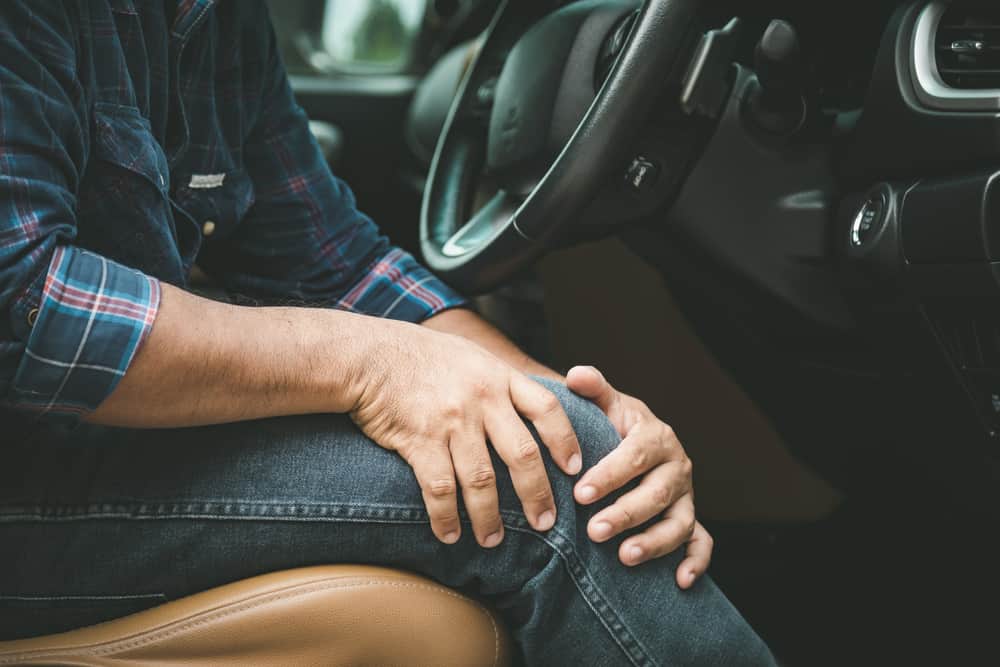We rely on our knees for so many small and large movements throughout the day, so when you’ve suffered an injury it can be debilitating. If you are struggling with a knee injury from a car accident, you might be wondering how long it will take for you to feel “normal” again. There are a number of factors that can affect your treatment and recovery timeline, including the type of injury, the severity of the injury, and your particular medical history, including any previous injuries. A knee injury can significantly impact your mobility after a car accident so it is important to follow through with treatment so you can experience a full recovery.
Types of Knee Injuries
There are a variety of knee injuries and many of these can depend on how the injury occurred during the car accident. Many times, a knee injury from a car accident occurs when a knee slams into the dashboard or is hit by something else in the car. Knee injuries can affect the knee joint as well as the surrounding bones, muscles, and soft tissues.
PCL Injury
A PCL injury refers to a knee injury that affects the posterior cruciate ligament (PCL) and is more commonly referred to as a “dashboard injury” or “dashboard knee”. When your knee hits the dashboard hard enough it can force your knee or shinbone backward and cause this specific ligament to tear. If you experience dashboard knee then you may notice symptoms of pain, swelling, stiffness, and even difficulty walking or putting weight on the knee.
MCL Injury
This type of knee injury involves the medial collateral ligament (MCL) and occurs when the dashboard or another object or part of the car slams into the front or side of your knee and causes this ligament to tear. Symptoms of an MCL injury are similar to a PCL injury, including pain, swelling, and an inability to put weight on the knee.
Soft Tissue Injuries
Soft tissues in your knee refer to ligaments like discussed above as well as muscles, tendons, and nerves. An example of a soft tissue knee injury from a car accident could be a pulled or torn muscle in or around your knee. A strained or sprained muscle that usually helps support your knee may not be able to do so, leading to pain and instability in the area.
Knee Dislocation and Fractures
While less common than other injuries, it is possible to dislocate your knee joint or experience a fracture in one of the many bones that make up your knee and leg. It is also possible to fracture or shatter your knee cap, also known as the patella, if your knee slams into the steering wheel or dashboard with a strong enough force. A knee fracture could refer to a small crack in one of the bones in your knee or could mean a clean break.
Treatment and Recovery Timeline for a Knee Injury
The first thing your doctor would do is to help you decide when you should get an MRI. Depending on the severity of your injury, your doctor might require a Knee MRI. Once they are able to determine the extent of your knee injury, they will start with the course of action.
For a mild knee injury from a car accident, your doctor will likely recommend the RICE treatment: rest, ice, compression, and elevation. This helps in a number of ways because you keep pressure off of the knee, ice the knee to help reduce any swelling, use some type of compression like a splint to help provide structure and support, and elevate the area for better blood flow. In general, a mild knee injury from a car accident may heal in 6 to 8 weeks, especially with rest and rehabilitation. Some more moderate knee injuries after a car accident will require a splint or cast to help offer more support, while crutches or a wheelchair can help you keep the weight off the knee while it heals. More severe knee injuries may require surgery with an orthopedic surgeon to fully address the injury. Moderate to severe knee injuries can take up to a year to fully heal.
No matter the severity of your knee injury, it is important to seek out treatment for a knee injury from a car accident with a highly skilled and qualified orthopedic doctor as soon as possible. Following through with the recommended treatment, stretches, exercises, and rehabilitation will help you to experience optimal recovery. At AICA Orthopedics, our multi-specialty team of car accident orthopedic doctors and surgeons can help get you on the road to recovery with an individualized treatment plan designed with you specifically in mind.





